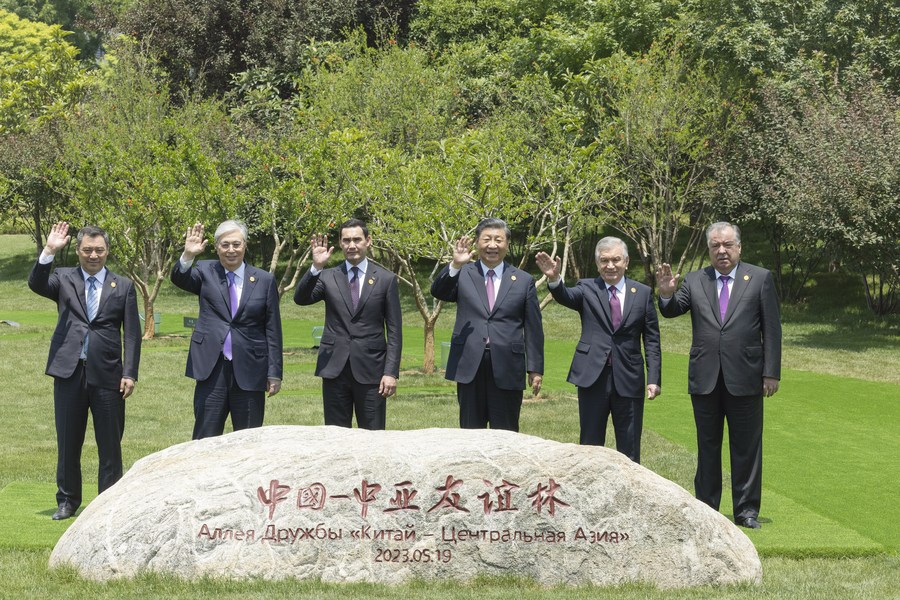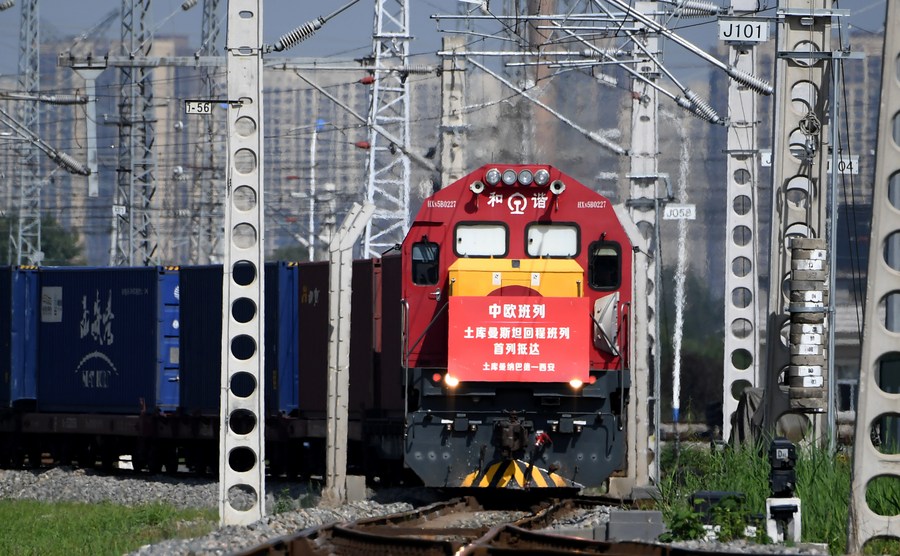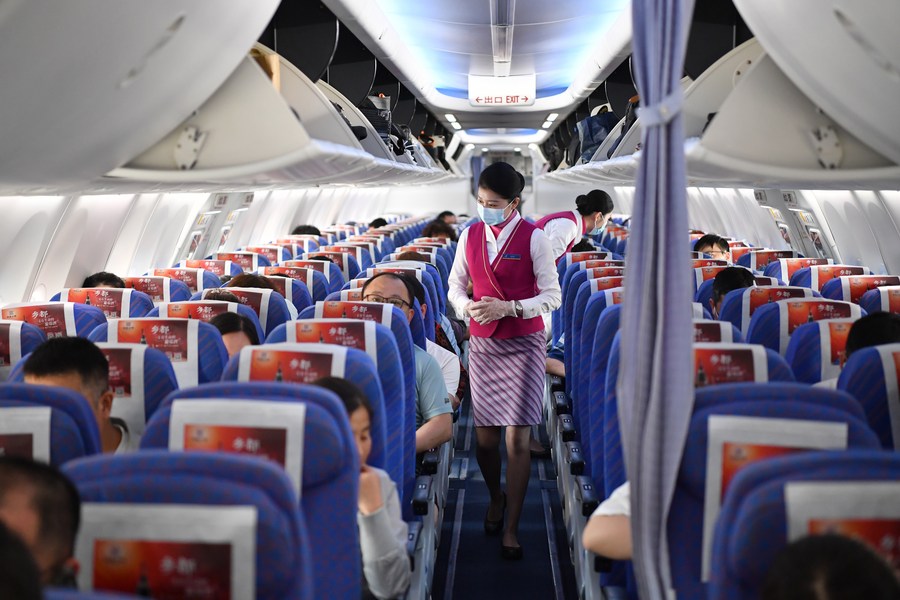* Underscoring the importance of a "stable," "prosperous," "harmonious" and "interconnected" Central Asia, Xi's vision in his keynote speech at the summit injected confidence and wisdom into the development of mutually beneficial relations among the six countries, and the endeavor to build an even closer China-Central Asia community with a shared future.
Ten years into Belt and Road cooperation, China and Central Asian countries have made historic achievements. In 2022, trade volume hit a record high of 70.2 billion U.S. dollars, an over 100-fold increase since diplomatic ties were established about three decades ago.
* As the ancient Silk Road bore witness to interactions between China and Central Asia through the trade of merchandise and flow of ideas, cultural cooperation and people-to-people exchanges between the two sides are still thriving today.
XI'AN, May 19 (Xinhua) -- Chinese President Xi Jinping on Friday expounded on how to build a China-Central Asia community with a shared future featuring mutual assistance, common development, universal security, and everlasting friendship, when he delivered a keynote speech at the China-Central Asia Summit held in the northwestern Chinese city here.
The event, which ran from Thursday to Friday, was attended by Kazakh President Kassym-Jomart Tokayev, Kyrgyz President Sadyr Japarov, Tajik President Emomali Rahmon, Turkmen President Serdar Berdimuhamedov and Uzbek President Shavkat Mirziyoyev. It is the first in-person gathering among heads of state of China and five Central Asian countries since China established diplomatic ties with them 31 years ago.
Underscoring the importance of a "stable," "prosperous," "harmonious" and "interconnected" Central Asia, Xi's vision in his keynote speech at the summit injected confidence and wisdom into the development of mutually beneficial relations among the six countries, and the endeavor to build an even closer China-Central Asia community with a shared future.

Chinese President Xi Jinping and leaders of five Central Asian countries plant six pomegranate trees that represent close China-Central Asia solidarity and cooperation after the first China-Central Asia Summit in Xi'an, northwest China's Shaanxi Province, May 19, 2023. (Xinhua/Liu Bin)
COOPERATION FOR COMMON DEVELOPMENT
Historically, the ancient Silk Road, starting in Xi'an, had been a vital corridor connecting the East and West since the Han Dynasty (202 B.C.-220 A.D.) about 2,000 years ago.
Such historical and geographic connection has been further strengthened in the modern age, as Xi proposed the idea of building an "economic belt along the Silk Road" in Kazakhstan in 2013, which, combined with the proposal of the 21st Century Maritime Silk Road, eventually became the Belt and Road Initiative (BRI).
Ten years into Belt and Road cooperation, China and Central Asian countries have made historic achievements. In 2022, trade volume hit a record high of 70.2 billion U.S. dollars, an over 100-fold increase since diplomatic ties were established about three decades ago.
During Friday's summit, Xi called on the six countries to continue taking the lead in Belt and Road cooperation and to promote the implementation of the Global Development Initiative.
He also called for efforts to fully unleash cooperation potential in traditional areas such as trade, industrial capacity, energy and transportation, and to foster new growth drivers in areas such as finance, agriculture, poverty reduction, low carbon, health and digital innovation.
Officials from Central Asian countries and global observers said the China-Central Asia cooperation will be a boon for the prosperity of the region and the world.

A China-Europe freight train loaded with raw materials of liquorice, a Chinese medicinal herb, which departed from Turkmenistan, arrives at Xi'an international port in Xi'an, northwest China's Shaanxi Province, Aug. 31, 2022. (Xinhua/Liu Xiao)
Considering the summit "very significant" for the development and modernization of the Central Asian states, Guzel Maitdinova, director of the Center for Geopolitical Studies at the Russian-Tajik (Slavonic) University, said the event will promote the synergy between the BRI with the national development strategies of the Central Asian countries.
Akkan Suver, head of the Istanbul-based Marmara Group Strategic and Social Research Foundation, described the meeting as "a new source of hope for the prosperity and peace of the region" and "a new beginning."
Saeed Chaudhry, director of Pakistan's Islamabad Council for International Affairs, said Central Asian countries see China as a big source of development and progress, with their close cooperation and connectivity always based on mutual respect, good-neighborly friendship, solidarity, and mutual benefit.
Chaudhry said he is confident that the increasingly close cooperation in multiple fields would bring a golden era of China-Central Asia relations in the near future for the welfare of the people in the region.
SECURITY AT THE HEART
The world needs a stable Central Asia. The sovereignty, security, independence and territorial integrity of Central Asian countries must be upheld; their people's choice of development paths must be respected; and their efforts for peace, harmony and tranquility must be supported, Xi said when addressing the summit.
Stressing the need to uphold universal security, the Chinese president said the six countries should act on the Global Security Initiative, stand firm against external attempts to interfere in domestic affairs of regional countries or instigate color revolutions, remain zero-tolerant to the three forces of terrorism, separatism and extremism, and strive to resolve security conundrums in the region.
His remarks were widely echoed by experts in the region and beyond.
Against the backdrop of global upheavals, this summit contributes to strengthening security and stability in the region, said Nurzhan Kasmalieva, head of the international department of Kyrgyzstan's Kabar state news agency.
In recent years, the cooperation between China and Central Asia in security and other fields has been further strengthened. For example, in the process of combating extremist terrorist activities, China has carried out close cooperation with law enforcement agencies and judiciary institutions in Central Asia.
Ahmed al-Saeed, chairman of Egypt's Bayt Al-Hekma Cultural Group, said, "China is developing an approach to security and development that is in line with the common interests of both sides, which is a great success for President Xi's diplomacy."
CLOSER PEOPLE-TO-PEOPLE BONDS
As the ancient Silk Road bore witness to interactions between China and Central Asia through the trade of merchandise and flow of ideas, cultural cooperation and people-to-people exchanges between the two sides are still thriving today.
For the sake of upholding the "everlasting friendship," Xi underlined the importance for the six countries to implement the Global Civilization Initiative, carry forward their traditional friendship, and enhance people-to-people exchanges.

Flight attendants conduct safety inspections before the first passenger flight of the Xi'an-Urumqi-Ashgabat route takes off in Xi'an, northwest China's Shaanxi Province, May 13, 2023. (Xinhua/Shao Rui)
He also declared a series of measures China will take to strengthen dialogue between civilizations, including providing government scholarships for Central Asian countries and opening special train services for cultural tourism in Central Asia.
Experts from the region said that Xi's vision will bring a great opportunity for relevant parties not only to maintain regional security and prosperity, but also to strengthen people-to-people and cultural exchanges.
Maitdinova, the scholar at the Russian-Tajik (Slavonic) University, said that high-level interactions are being observed not only in the political field, but also in the cultural and humanitarian sphere, mentioning that thousands of Tajik students study in China, many of whom have become successful entrepreneurs, translators and engineers.
People-to-people exchanges have also been extended to the field of cultural heritage preservation.
Citing the restoration project of Uzbekistan's ancient city of Khiva as a prominent example, Abdullayev Masharib Saydamatovich, deputy director of the Center for Promotion of Science at the Uzbekistan Academy of Sciences, said that he believes cultural cooperation between both sides will continue, and joint restoration work will become an important direction for their future cooperation. (Video reporters: Chen Changqi, Liang Aiping, Wu Hongbo, Sun Zhenghao, Li Shuting, Liu Chunhui, Yin Jiajie, Li Yaguang, Mei Yuanlong, Huang Aiping, Wu Hao, Hong Ling, Liu Bin, Yin Bogu, Qian Cheng, Yin Zhelun, Yuan Bingzhong, Sun Chengbin, Li Zhongfa, Sun Zhiping, Sun Bo, Mi Ligong, Chu Guoqiang, Lyu Xinhui, Du Rui; video editors: Ma Ruxuan, Li Qin









